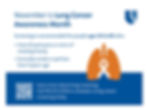New Study Finds Those Who Smoke and Vape Have Increased Lung Cancer Risk
- Jennifer Greyber
- Nov 13, 2025
- 3 min read
Quitting smoking and vaping is an important prevention measure for lung cancer
by Rachael Joyner, DNP, FNP-BC, APRN, Duke Smoking Cessation Program

As the landscape of e-cigarette use continues to evolve in the US, research has been mounting on the potential health harms. Previous studies have shown that e-cigarette use contributes to heart and lung disease. Now, a recent case control study conducted in Ohio shows a potential link between dual use – smoking both cigarettes and vaping – and an increased risk of lung cancer. The bottom line: those who smoke and vape have increased lung cancer risk.
This is concerning, considering that nearly 30% of US adults who use e-cigarettes also smoke combustible cigarettes, and 89% of daily e-cigarette users reported using e-cigarettes as a way of cutting down on cigarette smoking.
The study compared 4,975 people with recently diagnosed carcinoma of the lung to 27,294 control individuals without cancer. Researchers found that people who vaped and smoked cigarettes were four times more likely to develop lung cancer compared to those who only smoked cigarettes (OR=58.9 versus OR=13.9, P<0.001). Odds ratios were adjusted for gender, race, and age.
There are a couple of likely reasons for this finding.
First, smoking and vaping together result in higher delivery of carcinogens. (Studies so far have been conflicting on this point.)
Second, people who smoke and vape are more highly addicted and heavier tobacco users than people who only smoke cigarettes.
Speaking to Patients About Lung Cancer Prevention and Screening
November is National Lung Cancer Awareness Month, the perfect time to have conversations about this new potential risk factor for lung cancer with patients who smoke and vape. It is also important to discuss ways to prevent and screen for this deadly cancer. Lung cancer is the number one cause of cancer death in US men and women and is estimated to cause 124,730 deaths this year. Smoking is a primary cause of lung cancer, accounting for 90% of risk in men and up to 80% in women.
What makes this cancer so deadly is that it is often asymptomatic until it becomes advanced and harder to treat. Early detection through annual lung cancer screenings significantly improves outcomes and has helped save hundreds of thousands of lives. The US Preventative Services Task Force recommends that all adults age 50 to 80 who have at least a 20-pack year smoking history and are current smokers or have quit in the last 15 years receive annual screening.
National data from 2024 shows that only 16% of eligible people in the US received lung cancer screening. In North Carolina only an estimated 17.2% of eligible residents received screening.

Tobacco treatment specialists and other clinicians need to have conversations with patients around not only screening but also prevention of lung cancer through smoking cessation. A 2024 study in JAMA found that smoking cessation efforts between 1975 and 2020 have helped avert 3.45 million lung cancer deaths. Even after a cancer diagnosis, smoking cessation is vital. The National Cancer Institute (2022) asserts that “quitting smoking is among the most effective treatment options for improving the likelihood of survival, quality of life, and overall health of people with cancer who smoke.”
The Lung Cancer Initiative has many great resources around screening for patients and healthcare professionals.
Ready to turn insights into action? Enroll in our upcoming courses to master evidence-based strategies that help patients quit smoking and vaping, reduce cancer risk, and improve health outcomes. Explore our comprehensive tobacco treatment specialist training and CE Short Courses now at www.dukeunctts.com.
About the Author

Rachael Joyner, DNP, FNP-BC, APRN, is a family nurse practitioner with the Duke Smoking Cessation Program. She holds a National Certification in Nicotine and Tobacco Treatment and received her Doctorate in Nursing Practice from the University of Florida. She loves working collaboratively with patients to help them become tobacco free.
